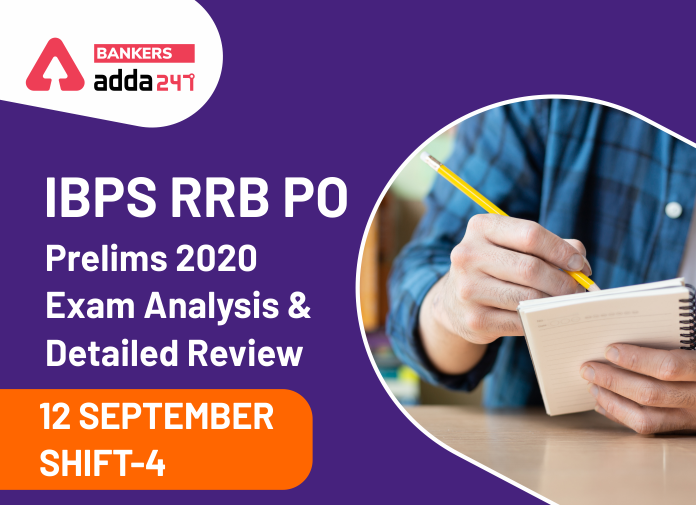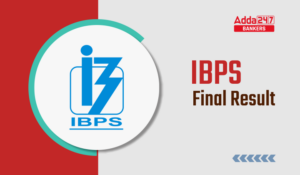Table of Contents
IBPS RRB PO Shift 4 Exam Analysis 2020 (12 September 2020)- It’s time to check the detailed exam analysis and review for the fourth shift of IBPS RRB PO Prelims Exam held on 12th Sept. This exam analysis and review will be really helpfull if you are going to appear in the IBPS RRB Officer Scale-I Exam tomorrow. There have not been many changes in the different shifts of the exam that took place on 12th September. Overall IBPS RRB PO 4th shift analysis the level of the prelims exam has been easy to moderate. The quantitative aptitude section was a bit tougher in this shift compared to the previous ones.
The shifts for the day are as follows:
- Shift-1: 7:30 AM
- Shift-2: 9:45 AM
- Shift-3: 12:00 PM
- Shift-4: 2:15 PM
- Shift-5: 4:30 PM
Overall Analysis & Good Attempts for IBPS RRB PO Prelims 2020 Shift 4
The level of the IBPS RRB PO Prelims Exam of 4th shift that took place on 12th September is easy to moderate as reported by the students who have appeared for the exam. The following are the average good attempts for this shift’s exam-
| Subject | Good Attempts |
| Reasoning Ability | 28 – 35 |
| Quantitative Aptitude | 24 – 27 |
| Total | 53 – 58 |
Also Check,
- IBPS RRB PO Prelims Memory Based Mock Tests & Live Discussion | Bilingual Batch by Adda247
- IBPS RRB Online Test Series 2020 RRB Office Assistant Prelims Test Series (Special Offer)
- Check IBPS RRB PO Prelims Exam Analysis of all Shifts
IBPS RRB Officer Scale-I Prelims Exam’s Section-wise Analysis 2020
The following are the IBPS RRB PO 4th shift analysis details of the topic asked in each section along with number of questions and the difficulty level.
IBPS RRB PO 4th shift analysis for Reasoning Ability (Easy to Moderate)
Puzzles and Seating arrangement asked in the 4th shift were as follows:
- Box based puzzle
- Age based puzzle
- Floor based puzzle
- Circular Seating Arrangement
The following table has complete details of the topic from which questions were asked in the 4th shift of IBPS RRB PO Prelims Exam 2020:
| Topics | No. of Questions | Level |
| Puzzle and Seating Arrangement | 20 |
Easy to Moderate
|
| Blood Relation | 1 | Moderate |
| Syllogism | 5 | Easy |
| Chinese Coding Decoding | 5 | Easy |
| Direction Sense | 3 | Easy |
| Order and Ranking | 1 | Easy |
| Inequality | 5 | Easy |
| Total | 40 | Easy |
Quantitative Aptitude (Moderate)
There were no questions of simplification and approximation in the 4th shift which has made the overall level of the quantitative aptitude section of this shift as moderate. There two sets of DI- Tabular DI, Pie Chart and Venn Diagram Caselet DI. The level of this section in shift-4 was tougher in comparision to the previous 3 shifts.
| Topics | No. of Questions | Level |
| Data Interpretation | 18 |
Moderate
|
| Wrong Number Series | 6 | Easy |
| Quadratic Equation | 6 | Easy to Moderate |
| Arithmetic Word Problems | 10 |
Easy to Moderate
|
| Total | 40 |
Moderate
|
The arithmetic word problems included questions from Ages, Simple Interest and Compound Interest, Time and Distance, Boats and Stream, Time and Work etc.
Also Check,
- IBPS RRB PO Prelims Memory Based Mock Tests & Live Discussion | Bilingual Batch by Adda247
- IBPS RRB Online Test Series 2020 RRB Office Assistant Prelims Test Series (Special Offer)
- Check IBPS RRB PO Prelims Exam Analysis of all Shifts
Team Bankersadda wishes you all the best for the exam in upcoming shifts!!! Do not miss out on practicing with the memory based paper of today’s exam if you are going to appear in IBPS RRB PO Prelims Exam on 13th September.
Register with Adda247 for IBPS RRB Mains Preparation 2020


IBPS RRB PO Prelims Exam Analysis Shift-4 FAQs
Q. What was the difficulty level of the questions asked in the shift-4 of IBPS RRB PO Prelims exam held on 12 September?
Ans. Overall the difficulty level was easy to moderate but quantitative aptitude section was more difficult or lengthy in comparision to the previous shifts.
Q. What are the good attempts for IBPS RRB PO Prelims 2020 Exam Shift-4 held on 12 September?
Ans. The average good attempts are 53 to 58 questions with good accuracy.
Q. What were the changes in the shift-4?
Ans. Quantitative Aptitude section was more difficult and there were no questions of simplification and approximation in this shift.
Q. How many puzzles and seating arrangement questions were there in shift-4?
Ans. There were 4 sets of puzzles and seating arrangement i.e. a total of 20 questions.









 IBPS Final Result 2025 Coming Out Tomorr...
IBPS Final Result 2025 Coming Out Tomorr...
 Coal India MT Exam Analysis 2025, 29 Mar...
Coal India MT Exam Analysis 2025, 29 Mar...
 SBI PO Exam Analysis 2025, Shift 4, 24 M...
SBI PO Exam Analysis 2025, Shift 4, 24 M...







